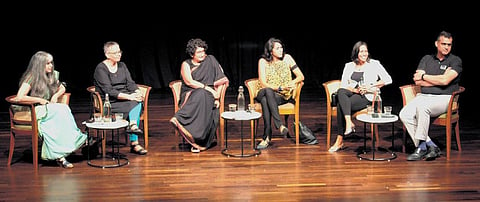

BENGALURU: The power balance in Indian sports is extremely uneven and unfair. Because there’s so much talent in the country, the people who control the sports bodies think they can just get rid of athletes who talk too much or protest too much,” said Sharda Ugra, a sports journalist with over three decades of experience, at a recent panel discussion organised at the Bangalore International Centre, Domlur. Prompted by the ongoing protests by wrestlers, including Olympians in Delhi, against alleged sexual harassment by sitting Member of Parliament Brij Bhushan Singh, the discussion titled ‘Wrestling with Power’ aimed to chart a course towards creating a safe and gender-just space in sports.
A six-member panel comprising Ugra, former athletes Nisha Millet and Reeth Abraham, activist Laxmi Murthy, and sports advocate Nandan Kamath highlighted issues that are plaguing the sports landscape in the country, such as an uneven balance of power between athletes and officials, the lack of accountability on the latter’s part and more.
Shedding light on some of the systemic deficiencies that are undermining sports in the country, advocate Kamath said, “It’s ironic that this movement has been called the safe sports movement. Sports is intrinsically safe unless someone makes it unsafe. So the fact that you have to add an adjective to it actually tells you a lot about the consequences down the line of a system that is rotten. It’s a symptom of a much larger disease of the way sport is operated and run in the country.” Highlighting the urgent need for improved governance within sports federations, Kamath also stressed the need to address ambiguous spaces that can be exploited.
“Sports actually lends itself to lots of ambiguous spaces. What you would consider in many other cases grooming towards a sexual offence is a very natural behaviour. Not to conflate the two, but there is an important differentiation between good touch and bad touch. A swimming coach who holds you under the water, for instance. A child or the athlete may not even know when that line is crossed,” he added.
To address the issue, Olympic swimmer Nisha Millet called for fostering a culture of awareness that ensures the safety and well-being of athletes. “We need to start talking about good touch and bad touch in sports early with athletes. We never had conversations like that with our parents, but they’re starting that in schools, maybe we need to start doing that in sports clubs as well.
Similar to how you get a list of banned substances, so that you’re aware of it, you should be taught about good and bad touches,” she said. Millet also called for greater involvement of women coaches in sports, and said: “When I go for a state meet, there’s me and there are 30 other male coaches on the deck. Maybe there’ll be one other female coach now and then…it’s just ridiculous.”
Athlete and Arjuna Awardee Reeth Abraham felt sports bodies should be headed only by sportspersons to not only minimise conflicts of interest, but also to ensure good governance. “Not all sportspersons are good administrators, but they will have a sense of what you need to do and what is required for the athletes to win. Politicians should support us and be patrons of sport, but they shouldn’t interfere in how sports are run,” she said.